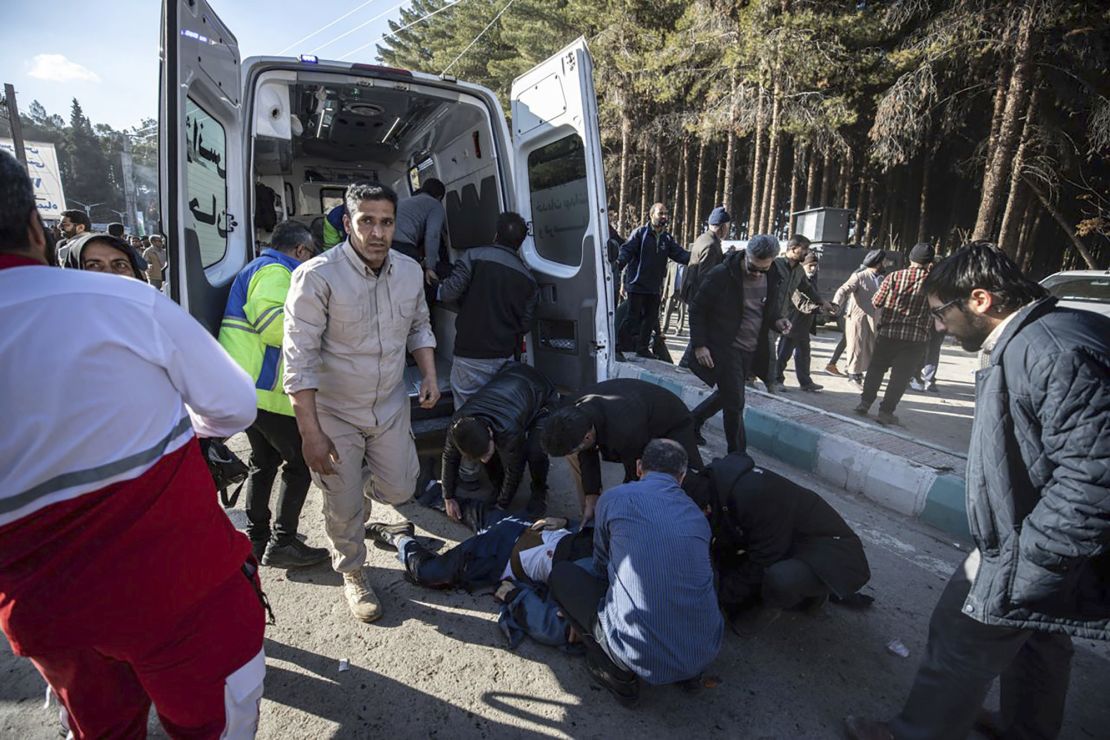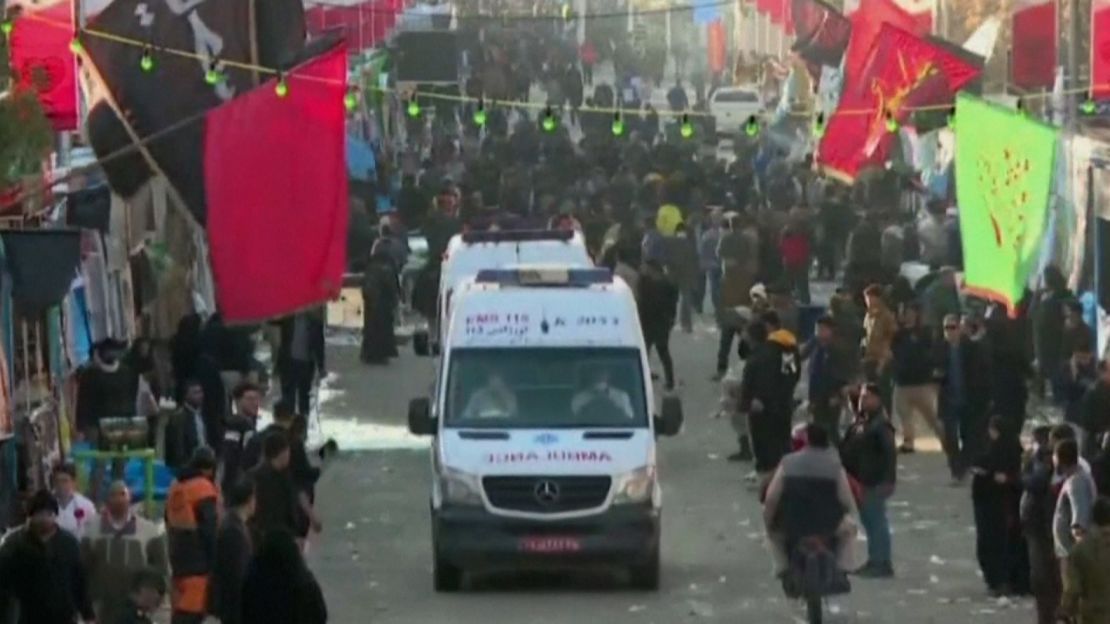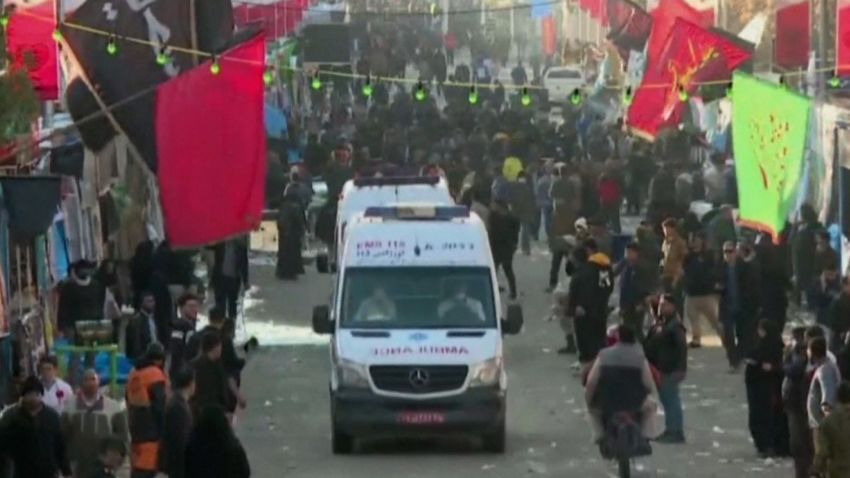Dozens of people were killed Wednesday in the Iranian city of Kerman after twin blasts near the burial site of slain military commander Qasem Soleimani, in what officials called a terror attack.
The blasts, at least one of which was caused by a bomb, state TV said, came on the fourth anniversary of Soleimani’s death in a US airstrike, and threaten to accelerate tensions in the region that have spiked since the start of the Israel-Hamas war in Gaza.
At least 84 people were killed and 284 others injured, according to state-run news agency IRNA, citing Jafar Miadfar, head’s of Iran’s national emergency agency. The toll was revised down due to the miscounting of body parts.
No group has claimed responsibility for the blasts, the deadliest to hit Iran since the 1979 revolution.
Iran’s President Ebrahim Raisi blamed Israel for the explosions, saying it will pay a “heavy price.”
“I warn the Zionist regime, do not doubt that you will pay a heavy price for this crime and the crimes you have committed,” Raisi said in a televised speech from Tehran. Raisi, who is the head of the Iranian government, warned that Israel’s punishment will be “regrettable and severe.”
The Israeli military told CNN it had “no comment” on the matter while the US State Department said it had no reason to believe Israel was involved.
Analysts and a US official speculated that the blast had the hallmarks of a terrorist attack.
“I think it’s just based on the MO it does look like a terrorist attack, the type of thing we’ve seen ISIS do in the past. And as far as we’re aware, that’s kind of I think our going assumption at the moment,” the official said.
Iran has suffered major Islamist terror attacks before. In 2022, at least 15 people were killed and 40 others injured in the southern city of Shiraz. ISIS claimed responsibility for the attack swiftly afterwards, saying it targeted groups of “Sunni infidels.”

The first explosion was 2,300 feet (700 meters) from Soleimani’s grave, and the second was 0.6 miles (1 kilometer) away as pilgrims visited the site, IRNA reported.
Soleimani was killed by a US airstrike ordered by former President Donald Trump at Baghdad International Airport on January 3, 2020.
IRINN, another state television channel, reported that the first explosion near the grave of Soleimani was caused by a bomb placed in a suitcase inside a Peugeot 405 car, and appeared to be detonated remotely.
Iran’s Interior Minister Ahmad Vahidi said the first explosion happened at 3:00 p.m. local time (6 a.m. ET) during an interview with Iran’s state news channel IRIB. Vahidi said the second, more deadly blast took place 20 minutes later, when other pilgrims came to help the injured.
Videos posted on Iranian state media showed large crowds running in the area after the explosion.
Footage also showed bloodied bodies being transported from the scene, and ambulances leaving the site through large crowds.
Iran’s Supreme Leader Ayatollah Ali Khamenei warned on X, formerly known as Twitter, that Iran will have a “harsh response.” Addressing those behind the explosions, he wrote: “They should know that the bright soldiers of the path of Soleimani will not tolerate their wickedness and crimes.”
Iran declared Thursday a day of mourning following the blasts and Raisi canceled his upcoming trip to Turkey.
Formerly one of Iran’s most powerful men, Soleimani was head of the Revolutionary Guards’ Quds Force, an elite unit that handles Iran’s overseas operations and was deemed to be a foreign terrorist organization by the US.

The Pentagon says Soleimani and his troops were “responsible for the deaths of hundreds of American and coalition service members and the wounding of thousands more.”
Known as Iran’s “shadow commander,” Soleimani – who had led the Quds Force since 1998 – was the mastermind of Iranian military operations in Iraq and Syria.
Gen. Ismail Qaani, Soleimani’s longtime lieutenant and his successor as the leader of the Quds Force, said the perpetrators were “desperate,” warning that “the Islamic Republic will not change the method of eradicating the Zionist regime.”
Blast comes at tense moment in region
The blast occurred amid heightened tensions in the region as Israel fights a three-month war against Hamas in Gaza prompted by the militant group’s October 7 attack on Israel.
That war has left more than 23,000 people dead in Gaza, according to the Hamas-run Ministry of Health in the enclave, and has led to skirmishes beyond Israel and Gaza, often involving Iran-backed militias.
On Tuesday, a senior Hamas leader was killed in a suburb of Beirut in a blast that a US official told CNN was carried out by Israel. Israel hasn’t confirmed or denied involvement but Hamas and the militant group Hezbollah, which controls the suburb, blamed Israel and have vowed revenge.
Last week, Iran and several of its armed proxies accused Israel of assassinating a senior Iranian commander in Syria, vowing retaliation. Israel didn’t comment on the matter.
In an address marking the anniversary of Soleimani’s death, Hezbollah leader Hassan Nasrallah said the killing of the Hamas official in Beirut “won’t go unpunished.”
Israel accuses Tehran of funding and arming Hamas. Israeli Defense Minister Yoav Gallant said last month that his country is in a “multi-arena war,” being attacked from seven arenas, including Iran. “We have already responded and acted in six of these decrees” he said.
On Wednesday, Russian President Putin condemned “terrorism in all its forms” in a letter to Iran’s Supreme Leader Ayatollah Ali Khamenei and President Ebrahim Raisi after the blasts. Putin, who is the subject of an arrest warrant from the International Criminal Court, has been accused by Kyiv and international bodies of numerous acts of terror during his war in Ukraine.
Both the European Union and the United Nations chief Antonio Guterres also condemned Wednesday’s blasts and called for the perpetrators to be held responsible.
The US has also stepped up its military involvement in the Middle East recently. Last month, the military carried out airstrikes on Iranian-backed Kataib Hezbollah and “affiliated groups” in Iraq after an attack injured three US troops.
And last week, US helicopters sank three boats belonging to Iran-backed Houthi rebels in the Red Sea after coming under fire, killing those on board. The event marked the first time since tensions broke out earlier last year that the US killed members of the rebel group.
The White House said it wasn’t seeking a wider conflict. The Houthis have carried out several attacks on merchant vessels in the Red Sea in retaliation for Israel’s assault on Hamas, disrupting trade in one of the world’s most important waterways.
This story has been updated with additional developments.
CNN’s Irene Nasser, Alireza Hajihosseini, Nectar Gan, Richard Roth, Samantha Waldenberg and Niamh Kennedy contributed reporting.







